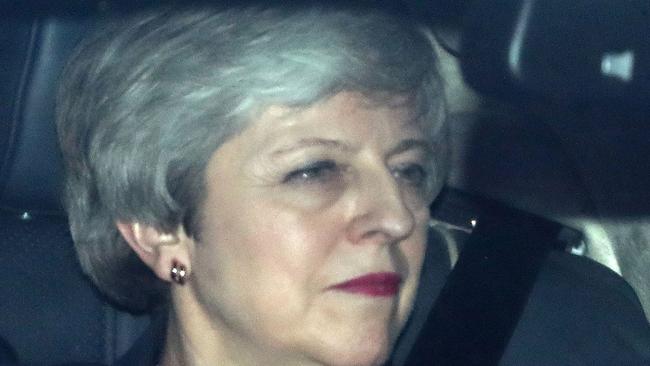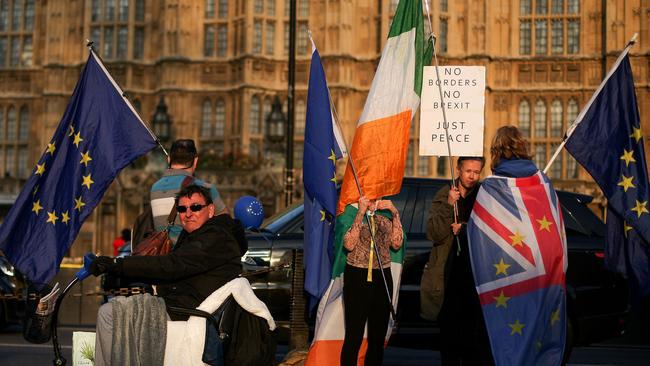Brexit: MPs wrest control but vote down all eight Brexit options
MPs vote down all eight amendments as PM is forced to announce she’ll quit.

British MPs today made history by taking control of the parliamentary timetable, only to vote down all eight Brexit options they had insisted on tabling.
The defeat of the different Brexit amendments once more illustrated the chaos into which Brexit has descended.
Only two options suggested by backbenchers appear to be in any way viable: that of having a confirmatory vote by the public of any Brexit deal; and the call for negotiations for a “permanent and comprehensive UK-wide customs union with the EU” in any Brexit deal.
Oliver Letwin, who had successfully led the backbench control of the parliamentary order, said he was “disappointed’’ that none of the eight Brexit options had succeeded.
He said there would be further debate on the Brexit options on Monday, but hoped that wouldn’t be the case if Theresa May gets her bill passed by then.
Mr Letwin said: “I personally continue to hold the hope my colleagues will see fit to support the government motion, which would obviate the necessity of future votes on Monday.’’
But the Brexit secretary Stephen Barclay said the results showed there was no easy result, nor a simple way forward.
He said the results of the indicative votes strengthened the government’s position that Mrs May’s deal was still the best option.
Scottish nationalist leader Ian Blackford called for a general election to break the deadlock.
He said: “This is a very serious for all of us, we have to reflect how the House of Commons tried to find a way through the Brexit crisis and we have failed. It is increasingly clear this House cannot find a way forward.. and we have to go back to the British people with a general election.’’
Earlier, in a stunning development, the British PM told Tory backbenchers she would resign in return for their support to get the Brexit withdrawal agreement passed in parliament.
However it is now uncertain whether the deal will even get tabled: this morning the Democratic Unionist Party dealt a huge blow to Mrs May by announcing it could not support the deal as long as the Irish backstop remains.
Arlene Foster, the leader of the DUP, announced the party “regrets that it is unable to support the deal”.
Ms Foster told Sky UK the Democratic Unionist Party supported “incredibly important” Brexit but couldn’t support the agreement while it “poses a threat to the integrity of the UK.”
LATEST⬇ï¸â¬‡ï¸ pic.twitter.com/bCzdbpQ6h0
— Arlene Foster (@DUPleader) March 27, 2019
The decision by the Tories’ coalition partner almost certainly scuppers any chance ot the deal passing despite some in the hard Brexit European Research Group swinging their support behind the deal, the group’s spokesman said this morning there was “no way” there was enough support to pass the deal.
Also this morning parliament voted to formally change the date of Brexit to May 22 if the deal is approved by March 29, or 12 April if no deal is approved. The amendment passed 441 to 105, a majority of 336.
Speaker of the House John Bercow made it even tougher for the Prime Minister to table the bill, repeating again his announcement last week that he wouldn’t allow a third vote unless the bill was substantially changed.
The mood in the 1922 Committee of backbench MPs was said to be sombre and sympathetic as Mrs May traded her premiership for extra votes to “get the deal through,’’ promising to step down as leader before the next stage of trade negotiations with the European Union.
Behind the scenes, many in the Tory party are falling in behind Michael Gove as a potential replacement.
There was no discussion of what would happen if Mrs May cannot get her deal through. However one MP, John Whittingdale, said that if the deal failed then: “It would not be a question if Mrs May stayed, but whether the government stays.’’
Just an hour before a series of history-making indicative votes called by parliamentary backbenchers to try and find a way out of the Brexit conundrum, Mrs May told her MPs: “I am leaving earlier than I intended’’.
She said: “This has been a testing time for our country and our party. We’re nearly there. We’re almost ready to start a new chapter and build that brighter future. And I have heard very clearly the mood of the parliamentary party. I know there is a desire for a new approach — and new leadership — in the second phase of the Brexit negotiations — and I won’t stand in the way of that. But we need to get the deal through and deliver Brexit.
“I am prepared to leave this job earlier than I intended in order to do what is right for our country and our party.
“I ask everyone in this room to back the deal so we can complete our historic duty — to deliver on the decision of the British people and leave the European Union with a smooth and orderly exit.’’
Labour leader Jeremy Corbyn said Mrs May’s pledge showed chaotic Brexit negotiations have been about party management, not principles or the public interest.
“A change of government can’t be a Tory stitch-up, the people must decide,’’ he said.
It is still not certain that Mrs May will have the necessary numbers for the Brexit Withdrawal Bill to pass. While her move will encourage many Brexiteers to now support the withdrawal agreement, there are several who remain opposed and the DUP, with ten votes, has yet to change its strong opposition.
One of the leading Brexiteers, Jacob Rees-Mogg said he would vote for the deal even if the DUP abstain. Mr Rees-Mogg, who has spoken strongly against Mrs May’s premiership in the past, told Sky UK Mrs May was ”exceptionally graceful” in her announcement to go.
“I admired her manner of announcing her departure,” he said.
Days after slamming the deal as a “constitutional humiliation, former foreign secretary Boris Johnson has also changed his mind and will now back it.
The government has cleared the way for parliament to sit on Friday, when the withdrawal agreement may be presented for the third time. If it passes, Downing Street has briefed that a Tory leadership contest will begin on May 27.
Mrs May’s final scheduled role as prime minister would then be to attend the G20 in Osaka Japan on June 28. On July 10, a new Conservative leader will be put in place.
But Mrs May’s dramatic acquiescence to Brexiteer demands could be scuppered by Mr Bercow.
Mr Bercow has ruled that not only has it to be significantly different to the previous motions, he has refused having any vote to disapply his ruling. He also instructed the clerks to block any attempt by the government to table a “notwithstanding” motion, even though he has allowed a notwithstanding motion in the indicative votes.
Mrs May’s fingertip grip on her Tory party was further weakened earlier this morning when 33 Tory MP’s defied the whip and crossed the floor to vote in favour of a business motion allowing the indicative votes to go ahead. This is three more than the 30 who rebelled earlier in the week allowing backbenchers to determine the parliamentary order paper for today.

Results of the eight indicative votes:
Amendment B: No deal, tabled by John Baron. It proposes leaving the European Union without a deal on April 12.
Yes, 160: No, 400
Amendment D: Common market 2.0, tabled by Nick Boles. This proposes UK membership of the European Free Trade Association and European Economic Area. It calls for continued participation in the single market and a comprehensive customs arrangement with the EU after Brexit until the agreement of a wider trade deal which guarantees frictionless movement of goods and an open border in Ireland.
Yes, 188: No, 283
Amendment H: EFTA and EEA, tabled by George Eustice. This proposes remaining within the EEA and rejoining EFTA, but remaining outside a customs union with the EU.
Yes, 65: No, 377
Amendment J: Customs union, tabled by Ken Clarke. This calls for negotiations for a “permanent and comprehensive UK-wide customs union with the EU” in any Brexit deal.
Yes, 264: No, 272
Amendment K: Customs union and alignment with single market, tabled by Labour. Labour wants a close economic relationship with the EU including a comprehensive customs union, alignment with the single market; matching EU rights and protections; including funding and security arrangements.
Yes, 237: No, 307
Amendment L: Revocation to avoid no deal, tabled by Joanna Cherry. This calls for a vote on a no-deal Brexit two sitting days before the scheduled date of departure. If no deal is not agreed then Brexit must be revoked.
Yes, 184: No, 293
Amendment M: Confirmatory public vote, tabled by Margaret Beckett. This motion requires a public vote to confirm any Brexit deal passed by parliament before its ratification.
Yes, 268: No, 295
Amendment O: Contingent preferential arrangements, tabled by Marcus Fysh.
This calls for the government to seek to agree preferential trade arrangements with the EU, in case the UK is unable to implement a withdrawal agreement with the bloc.
Yes, 139: No, 422



